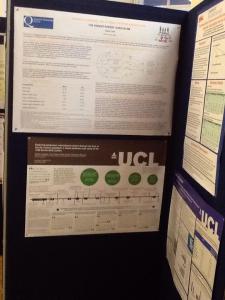I am at the Centre for Longitudinal Studies Research Conference today (March 16th 2015) and tomorrow. I submitted my first academic poster to the conference and here it is, at the bottom, looking cute:
Here are a few more nuggets to whet your appetite:
You can download the full PDF here.I have never really understood the purpose of academic posters. I kind of always cynically thought they are there as a useful thing for lonely conference delegates to pretend to read at tea and lunch breaks. Is that true? Or is it just me that does that? I thought of lonely people when I designed it, so put a lot of detail into it so they could linger for a long time! They can use it as a conversation starter – naming all the Prime Ministers on the timeline for example.
So after the day at the conference, how do I feel? Well, I think the process of producing the poster was actually really useful. It is really hard to distil your topic down onto one page so that helped with my thinking.
However, I spent a huge amount of time on it. Perhaps too much given that I seem incapable of speaking to anyone about it so am currently thinking if it was worth the effort. I have not spoken to anyone about it partly because there is actually no room to stand by it, so no one knows it is mine. I am just hoping someone gets the vibe from the weirdo (me) standing behind them that I would be interested in hearing what they think.
So at the end of day 1, I still do not see the benefits of posters beyond making you think about the focus of your project and presenting your work in a visual pleasing way. I just feel socially awkward and stressed that I put all that work in and am not making a big enough effort to speak to people about it and get feedback on it.
Right, tomorrow is a new day. So I have produced some photocopies now. Perhaps that will help people to engage with it.
We shall see!

![CAO52FFWAAACid-[2]](https://annikacoughlin.files.wordpress.com/2015/03/cao52ffwaaacid-2.jpg?w=225&h=300)
![CAO6hDdW8AAFhV1[1]](https://annikacoughlin.files.wordpress.com/2015/03/cao6hddw8aafhv11.jpg?w=300&h=225)
![CAO516vXEAAyC3V[1]](https://annikacoughlin.files.wordpress.com/2015/03/cao516vxeaayc3v1.jpg?w=225&h=300)
![CAO6KtgWcAEIJIG[1]](https://annikacoughlin.files.wordpress.com/2015/03/cao6ktgwcaeijig1.jpg?w=300&h=225)
![CAO65SJW4AEAfpV[1]](https://annikacoughlin.files.wordpress.com/2015/03/cao65sjw4aeafpv1.jpg?w=300&h=225)